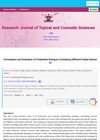 2 citations,
March 2019 in “European Journal of Dermatology”
2 citations,
March 2019 in “European Journal of Dermatology” Pharmacy-sold shampoos tend to have fewer allergens compared to those sold in other stores.
 67 citations,
April 2007 in “Journal der Deutschen Dermatologischen Gesellschaft”
67 citations,
April 2007 in “Journal der Deutschen Dermatologischen Gesellschaft” Shampoos are designed to clean and improve hair and scalp health, with specific ingredients for different hair types and conditions.
 21 citations,
July 1988 in “Clinics in dermatology”
21 citations,
July 1988 in “Clinics in dermatology” Good haircare and communication with doctors are key for managing hair loss.
 2 citations,
January 2015 in “Elsevier eBooks”
2 citations,
January 2015 in “Elsevier eBooks” The document says biodegradable cosmetics and packaging are better for the environment and user experience.
 1 citations,
December 2022 in “Research journal of topical and cosmetic sciences”
1 citations,
December 2022 in “Research journal of topical and cosmetic sciences” The herbal shampoo cleans well, promotes hair growth, and improves hair quality.
 1 citations,
October 1984 in “Clinics in dermatology”
1 citations,
October 1984 in “Clinics in dermatology” People distressed by minor skin changes should consult dermatologists with cosmetic expertise, and a public Cosmetic Dermatology Service with mental health support is recommended.
 8 citations,
July 2012 in “Annals of biomedical engineering”
8 citations,
July 2012 in “Annals of biomedical engineering” Hair absorbs molecules differently based on their size, charge, and love for water, and less at higher pH; this can help make better hair products.
 7 citations,
July 2003 in “Clinics in Dermatology”
7 citations,
July 2003 in “Clinics in Dermatology” The article helps identify common, non-harmful skin conditions in newborns to avoid undue concern and treatment.
 11 citations,
January 2020 in “BMC pediatrics”
11 citations,
January 2020 in “BMC pediatrics” New mutations in the SLC39A4 gene found in twins help understand the genetic cause of acrodermatitis enteropathica.
 6 citations,
February 1974 in “The BMJ”
6 citations,
February 1974 in “The BMJ” The document concludes that scalp disorders can be treated with hair washing, specific shampoos, medications, and sometimes surgery or hair transplants, but hereditary baldness is untreatable.
 17 citations,
April 2006 in “Dermatologic Clinics”
17 citations,
April 2006 in “Dermatologic Clinics” Older women face various skin issues like dryness and thinning, and treatments are available but can have side effects; proper skin care and legal health decisions are important.
 5 citations,
January 2017 in “Elsevier eBooks”
5 citations,
January 2017 in “Elsevier eBooks” The document concludes that cosmetics need biocompatible, eco-friendly ingredients due to aging populations and demand for effective products.
182 citations,
November 2018 in “Cosmetics” Seaweeds have beneficial compounds for skin care, including anti-aging and protective effects.
 1 citations,
December 2022 in “Middle East Journal of Science”
1 citations,
December 2022 in “Middle East Journal of Science” Permanent hair dyes use chemicals that react with hydrogen peroxide to create color.
 January 2019 in “ARC journal of pharmaceutical sciences”
January 2019 in “ARC journal of pharmaceutical sciences” Acne can be managed with various treatments and requires psychological support due to its emotional impact.
 233 citations,
February 2018 in “Polymers”
233 citations,
February 2018 in “Polymers” Chitin and chitosan are useful in cosmetics for oral care, haircare, and skincare, including UV protection and strength improvement.
 3 citations,
February 2023 in “ACS omega”
3 citations,
February 2023 in “ACS omega” Grape seed oil improved hair quality the most, followed by rosehip and safflower seed oils, and reduced damage from shampoo.
 3 citations,
September 2005 in “International Journal of Cosmetic Science”
3 citations,
September 2005 in “International Journal of Cosmetic Science” Different oils penetrate hair differently; monounsaturated oils like olive oil penetrate better than polyunsaturated oils.
 3 citations,
July 2021 in “International journal of pharmaceutical chemistry and analysis”
3 citations,
July 2021 in “International journal of pharmaceutical chemistry and analysis” Medicinal plants like Aloe, Amla, and Coconut oil help with hair and skin care.
 47 citations,
May 2021 in “Polymers”
47 citations,
May 2021 in “Polymers” Jojoba oil is highly valued for its diverse medicinal and industrial uses.
 June 2018 in “International journal of trend in scientific research and development”
June 2018 in “International journal of trend in scientific research and development” The review explains how hair products work and the science of different hair types to help improve hair care research.
 4 citations,
February 2017 in “Journal of Cutaneous Medicine and Surgery”
4 citations,
February 2017 in “Journal of Cutaneous Medicine and Surgery” Compounds from certain trees used by First Nations people show potential for treating skin conditions and promoting hair growth, but more research is needed to confirm their safety and effectiveness.
84 citations,
April 2015 in “Cosmetics” Hair dyes vary in how long they last and how deeply they penetrate hair.
 9 citations,
March 2011 in “Oxidative stress and disease”
9 citations,
March 2011 in “Oxidative stress and disease” Some herbal treatments are effective for skin disorders, but more research and regulation are needed.
2 citations,
July 2018 in “Skin research and technology” Greasy hair spreads sebum twice as much as nongreasy hair over time.
 191 citations,
February 2002 in “Archives of Dermatology”
191 citations,
February 2002 in “Archives of Dermatology” Some herbal therapies may help with skin conditions, but more research is needed to confirm their safety and effectiveness.
 18 citations,
June 2019 in “Clinical research in dermatology”
18 citations,
June 2019 in “Clinical research in dermatology” Acne can't be cured but can be managed with treatments like benzoyl peroxide and diet changes; it's costly and can lead to scarring and mental health issues.
 1 citations,
January 2024 in “International Journal of Advanced Research in Science, Communication and Technology”
1 citations,
January 2024 in “International Journal of Advanced Research in Science, Communication and Technology” Herbal hair scrubs can effectively prevent and treat hair problems, boosting self-confidence.
 9 citations,
November 2008 in “Journal of Cosmetic Dermatology”
9 citations,
November 2008 in “Journal of Cosmetic Dermatology” Artificial hair implantation is generally safe and can restore hair when other treatments fail, but some patients may experience side effects.
 11 citations,
September 2013 in “Otolaryngologic Clinics of North America”
11 citations,
September 2013 in “Otolaryngologic Clinics of North America” The document concludes that improving the appearance of posttraumatic facial scars is possible with careful treatment and realistic expectations.



























